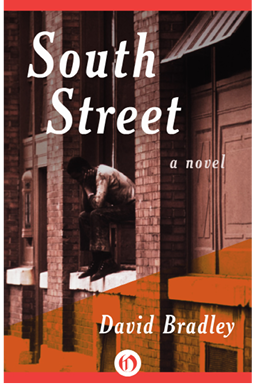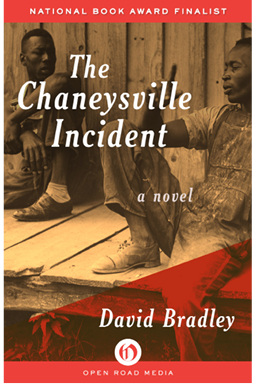South Street (55 page)

“Oh no, brother, it ain’t none a my business.”
“You don’t want to know why?”
“
Ours
,” Earl quoted, “
is not to reason why
. Tennyson.”
“You know that, Earl, or you just read Bartlett every damn night?”
“I know it, Adlai, I know it all. Do you?”
“Yeah,” Brown snapped.
“Damn,” Earl said, “and to think there ain’t but one of you.” He opened his paper.
The bus grumbled and growled, lumbered across Broad Street belching smoke like a tubercular dragon. The driver hauled at the wheel, hit the brakes, brought the bus to a halt at Fifteenth Street. A man got on, slowly, unsteadily, hung onto the fare box, fumbling for coins, dropped them into the fare box. The man stood, hanging onto a stanchion. “You’re gonna have to siddown, buddy,” the driver said.
“I want ma transfer.”
Brown’s head snapped around at the sound of the voice. He peered through the golden glare of sunlight lancing through the windshield. To Brown’s eyes the man was a swaying shadow in a hazy halo.
“Transfer’s another nickel, buddy,” the driver was saying. “Now, will you move back behind the line so I can see the mirror.”
“What about ma transfer?”
“Rayburn,” Brown breathed.
Earl looked at him. “Friend a yours?” Brown did not reply. Earl looked toward the front of the bus.
“Look, buddy, the base fare is twenty-five cents. Transfer’s a nickel more. You want a transfer, you owe the box a nickel. Now, will you get behind the line.”
“Box, shit,” Rayburn said. “I don’t owe nothin’ to no damn box.”
“Shees,” the driver said. He tromped down on the pedal and the bus rumbled away from the corner. “Here—” he ripped off a transfer coupon and handed it to Rayburn. “Now, will you get back behind the line?” Rayburn stumbled across the yellow restraining line and hung onto a grab bar like a hulking ape, peering at his orange transfer.
“Driver!” said the lady in black. “Can’t you make this man move to the rear? He smells.”
“Shees,” said the driver.
Brown turned away, stared at the cross streets as the numbers climbed.
“He smells,” the lady in black said again.
Rayburn staggered the length of the bus, took a seat facing Brown and Earl. “Brothers,” Rayburn said. Brown smiled. Earl nodded uneasily. Rayburn looked at Brown without recognition. “I hope y’all ain’t gonna mind me rappin’,” Rayburn said. “I love to rap. I sure do. I can rap in ten languages.” He counted on his fingers. “English. ’Merican. Nigger. Spic. Wop. Jap. Hell, that ain’t but six. I’ll remember the rest in a minute.” Brown looked at him, his face blank. Earl studied the back page of the book review. The bus crossed Seventeenth Street. “Useta live down there,” Rayburn said, pointing. Brown looked south. “Me an’ ma woman. I left the bitch. Me, I got to keep flyin’.”
The bus slowed as it approached Eighteenth Street, but the light changed, and it rolled on across, picking up speed as the street sloped down toward the Schuylkill. Brown turned to the window. South Street passed in strobe-light flashes, glimpses down the passing streets.
“That’s what I useta do,” Rayburn said. “Fly. Air force. I could fly any goddamn thing they had. Fuckin’ fighter planes, jets, helicopters, any goddamn thing. Rockets. Speed, baby. I was the fastest thing in the world. Broke the sound barrier a hundred times. Broke the damn light barrier. Broke every damn barrier them honkies
had
. They got so they was worried there wasn’t gonna be no barriers left for them white boys. Them goddamn generals, they’d set around all fuckin’ week long tryin’ to think up new ones. Then I’d go out on Saturday afternoon an’ blow ’em away.” Brown was staring out the window. South Street passed in glaring glimpses. Rayburn touched Earl’s knee. “Saturday afternoon. Spare time. You dig?”
“I can’t take this,” Earl said. He got up and went to the front of the bus and took the seat across from the lady in black, who turned up her nose.
“They couldn’t figure out if they was gonna send me to the moon or not, but they was afraid I’d be so damn fast gettin’ up there wouldn’t nobody believe it.”
Brown looked at him. “You might as well be fast,” Rayburn said. Brown looked back to the window, but the bus had reached the end of Lombard Street. It curved around slowly, climbed a slight rise, paused at a blinking yellow light, then swung up onto the South Street Bridge. Brown twisted in his seat, tried to look out the back window, but smoke and grime had coated the glass. Rayburn touched Brown’s arm. “I’ma get outa here,” Rayburn said. “I gots to be flyin’. I got ma transfer.” He held it up. “You see, I’m on ma way.”
“I see,” Brown said. He got up quickly and swung to the front. The bus slowed, halted at the traffic light controlling the entrance to the Expressway, hanging on concrete over the river. “Let me out,” Brown said.
The driver looked up. “No stop here.”
“I want out here.”
“Stop’s on the other side.” The light changed. The driver pressed the accelerator. Brown grabbed him by the throat.
“I want out here,” Brown said.
The driver jammed on the brakes. “Sure, buddy, sure, anything you say.” He hit the release lever. Air hissed. The doors popped open. Brown stepped down onto the pavement. The door closed quickly behind him.
“Shees,” said the driver, rubbing his neck.
“They should never have let them use the public busses,” said the lady in black. “It’s just not safe.”
“Shees,” said the driver. “Sunday afternoon. Same goddamn story. Drunks an’ nuts.”
“The light’s green,” Earl said.
The driver turned and glared at him. “That friend a yours is sick. Sick, you know what I mean? Sick.”
“Never saw him before,” Earl said.
“All belong to the Black Muslims or somethin’, an’ you’re all sick. Goin’ around chokin’ folks. Sick.”
“You don’t move this piece a shit off this bridge, I’m liable to choke you myself,” Earl snapped.
The driver turned hurriedly. The light had gone red, but he pulled the bus away from the curb anyway. One hundred and sixty-two yards beyond the western bank of the Schuylkill the bus crossed Thirty-third Street, and South Street quietly, almost gratefully, became Spruce.
David Bradley is an associate professor of creative writing at the University of Oregon and the author of
South Street
and
The Chaneysville Incident
, the latter of which won the PEN/Faulkner Award in 1982 and was a finalist for the National Book Award. The novel also earned Bradley an Academy Award for literature. Bradley has published essays, book reviews, and interviews in periodicals and newspapers including
Esquire
,
Redbook
, the
New York Times
, the
Los Angeles Times
, and the
New Yorker
.
All rights reserved, including without limitation the right to reproduce this ebook or any portion thereof in any form or by any means, whether electronic or mechanical, now known or hereinafter invented, without the express written permission of the publisher.
This is a work of fiction. Names, characters, places, events, and incidents either are the product of the author’s imagination or are used fictitiously. Any resemblance to actual persons, living or dead, businesses, companies, events, or locales is entirely coincidental.
Copyright © 1975 by David H. Bradley, Jr.
Cover design by Mauricio Diaz
978-1-4804-3853-8
This edition published in 2013 by Open Road Integrated Media, Inc.
345 Hudson Street
New York, NY 10014


Open Road Integrated Media
is a digital publisher and multimedia content company. Open Road creates connections between authors and their audiences by marketing its ebooks through a new proprietary online platform, which uses premium video content and social media.
Videos, Archival Documents,
and
New Releases
Sign up for the Open Road Media newsletter and get news delivered straight to your inbox.
Sign up now at
FIND OUT MORE AT
FOLLOW US:



